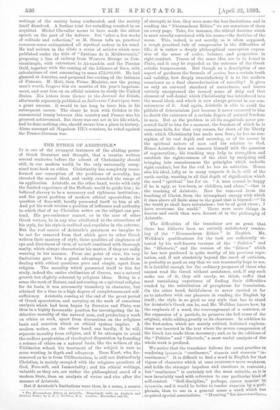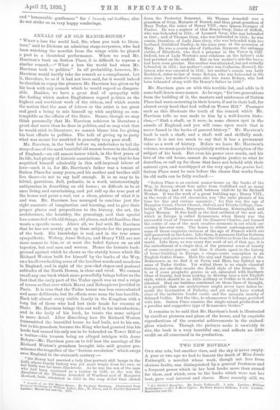THE ETHICS OF ARISTOTLE.*
IT is one of the strangest instances of the abiding power of Greek literature and thought, that a treatise written several centuries before the advent of Christianity should still, in our modern world, be the only universally recog- nised text-book on ethics. Christianity has completely trans- formed our conception of tbe problems of morality, has elevated the moral ideal, and vastly extended the range of its application. Aristotle, on the other hand, wrote with only the limited experience of the Hellenic world to guide him ; he believed slavery to be a necessary and righteous institution; and, the great problem of modern ethical speculation, the question of free-will, hardly presented itself to him at all. And yet his work retains a position of influence and authority to which that of no Christian writer on the subject can pre- tend. His pre-eminence cannot, as in the case of other Greek writers, be in any wise attributed to the attractions of his style, for his style is crabbed and repulsive in the extreme. But the real source of Aristotle's greatness we imagine to be not far removed from that which gave to other Greek writers their mastery of style, those qualities of singleness of eye and directness of view, of naiveté .combined with thorough sanity, which always characterise his matter, if they are sadly wanting in his manner. From one point of view, his very limitations gave him a great advantage over a modern in dealing with ethical questions pure and simple, apart from religion. The morality which presented itself to him for study, indeed the entire civilisation of Greece, was a natural growth but slightly coloured by religious ideas. Being in a sense the work of Nature, and not resting on a spiritual religion for its basis, it was necessarily transitory in character, but attained for a time to a high degree of completeness and self- sufficiency. Aristotle, coming at the end of the great period of Greek speculation, and carrying on the work of conscious analysis which had been begun by Socrates and Plato, was thus in a highly favourable position for investigating the in- stinctive morality of the natural man, and producing a work on ethics as such, apart from discussions on the religious basis and sanction which an ethical system implies. A modern writer, on the other hand, can hardly, if he will, separate morality from religion, and if he attempts to avoid the endless perplexities of theological disputation by founding a science of ethics on a natural basis, like the writers of the Utilitarian school, his treatment of the subject is sure to seem wanting in depth and adequacy. Even Kant, who, far- removed as he is from Utilitarianism, is still not distinctively Christian, is mainly occupied with the religious questions of God, Free-will, and Immortality ; and his ethical writings, valuable as they are, are rather the philosophical creed of a modern Stoic, than an analysis of virtue and vice after the manner of Aristotle.
But if Aristotle's limitations were thus, in a sense, a source
* Th4 Nkommehea.n Rthics of Aristotle. Translated, with an Analysis and Chit:cal Notes, by J. E, C, W1lloi,, M.A. London Macmillan and Oo.
of strength to him, they were none the less limitations, and in reading the " Nicomachean Ethics" we are conscious of them on every page. Take, for instance, the ethical doctrine which is most usually associated with his name,—the doctrine of the mean. This, indeed, is not merely, as is often supposed, a rough practical rule of compromise in the difficulties of life; it is rather a deeply philosophical conception expres- sive of the sense of order, balance, and proportion in right conduct. Traces of the same idea are to be found in Plato, and it may be regarded as the outcome of the Greek artistic temperament. But though as a description of one aspect of goodness the formula of theec;es; has a certain truth and validity, how deeply unsatisfactory it is to the modern conscience as a final characterisation of morality I It gives us only an outward standard of correctness, and leaves entirely unexpressed the inward sense of duty and that element of self-denial which Christianity has introduced into the moral ideal, and which is now always present in our con- sciousness of it. And again, Aristotle is able to avoid the pitfalls of determinism just because it never occurred to him to doubt the existence of a certain degree of natural freedom in man. But as the problem in all its magnitude never pre- sented itself to him for a moment, the freedom of which he is conscious falls, for that very reason, far short of the liberty with which Christianity has made men free ; he has no con- ception of its real depth and meabing, or of its source in the spiritual nature of man and his relation to God. Hence Aristotle does not concern himself with the question of regeneration; his teaching may help to strengthen and establish the righteousness of the elect by analysing and bringing into consciousness the principles which underlie right conduct, but for the evil he has no salvation. Hence also his ideal, lofty as in many respects it is, is still of the earth earthy, wanting in all that depth of signification which the word " spiritual " has for us. "A man cannot be happy if he is ugly, or low-born, or childless, and alone,"—that is the teaching of Aristotle. How far removed from the teaching of Christ, from the triumphant energy with which it rises above all finite aims to the good that is beyond :—" lit the world ye shall have tribulation: but be of good cheer ; I have overcome the world." There were more things in heaven and earth than were dreamt of in the philosophy of Aristotle.
The difficulties of the translator are so great that there has hitherto been no entirely satisfactory render. ing of the " Nicomachean Ethics" in English. Mr. Welldon's qualifications for the task are sufficiently at. tested by his well-known versions of the " Politics " and the "Rhetoric;" and the version of the "Ethics" which he has now produced is quite worthy of his previous repu- tation, and, if not absolutely beyond the reach of criticism, is probably as good as any that we can reasonably hope to see. It is faithful enough for the ordinary purposes of those who cannot read the Greek without assistance, and, if any such make use of it, they will rarely, we think, suffer that most tantalising experience of finding their difficulties evaded by the substitution of paraphrase for translation. On the other hand, faithfulness is never carried so far as to interfere with our pleasure in reading the English by itself ; the style is as good as any style that has to stand for Aristotle's Greek can be, and Mr. Welldon knows how, by the emphasis of a word, the rearrangement of a sentence, or the expansion of a particle, to preserve the full sense of the original, while adding greatly to its clearness. In addition to the foot-notes, which are mainly critical, italicised explana- tions are inserted in the text where the severe compression of the Greek has made them necessary; and, as in the editions of the 4' Politics" and "Rhetoric," a most useful analysis of the whole work is prefixed.
We notice that the translator follows the usual practice in rendering iyx.paTeice "continence," oixpaala and oixparila "in- continence." It is difficult to find a word in English for that vigour of character which at once overcomes mere weakness, and holds the stronger impulses and emotions in restraint ; but "continence" is certainly not the most suitable, as it is now invariably used with reference to one particular kind of self-control. "Self-discipline," perhaps, comes nearest to ircpargta, and it would. be better to render 2ale:61.01a by a pen- phrasis, than to use in a general sense a word which has acquired special associations. " Humbug" for taaa.,,Dirongiupyol, and "honour-able gentleman" for s' iriErxic xed eA06AEpoc, also do not strike us as very happy renderings.







































 Previous page
Previous page